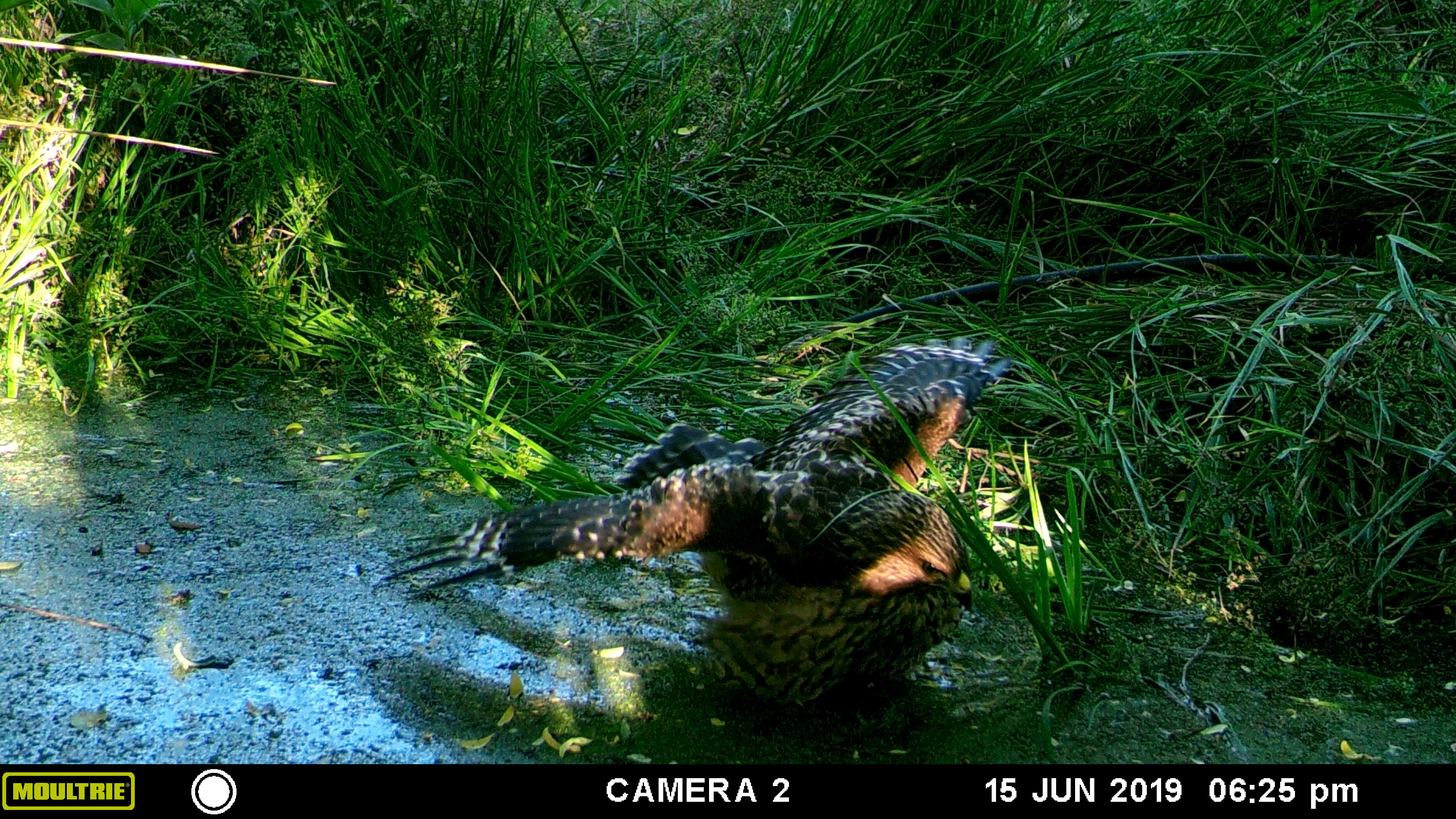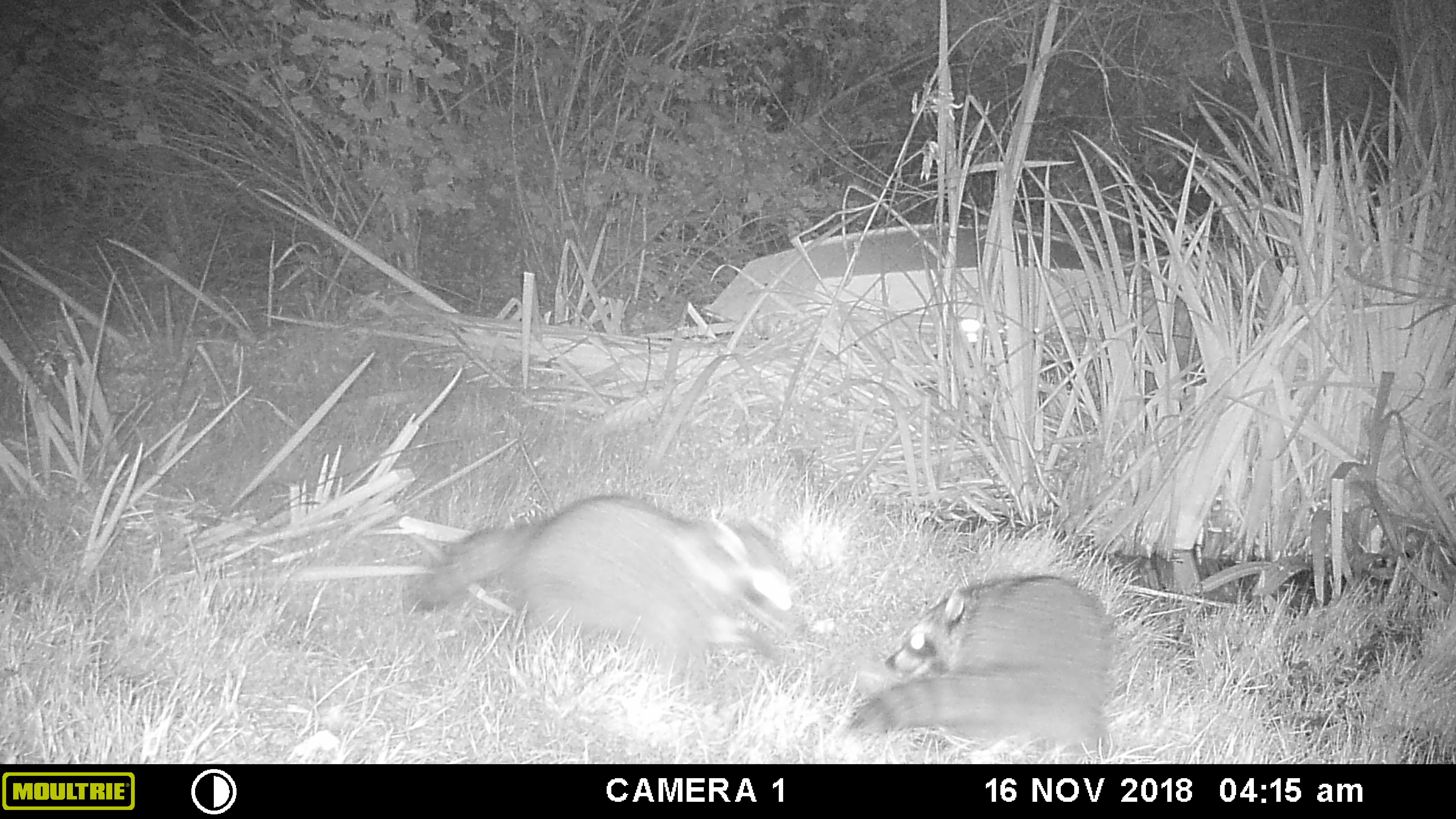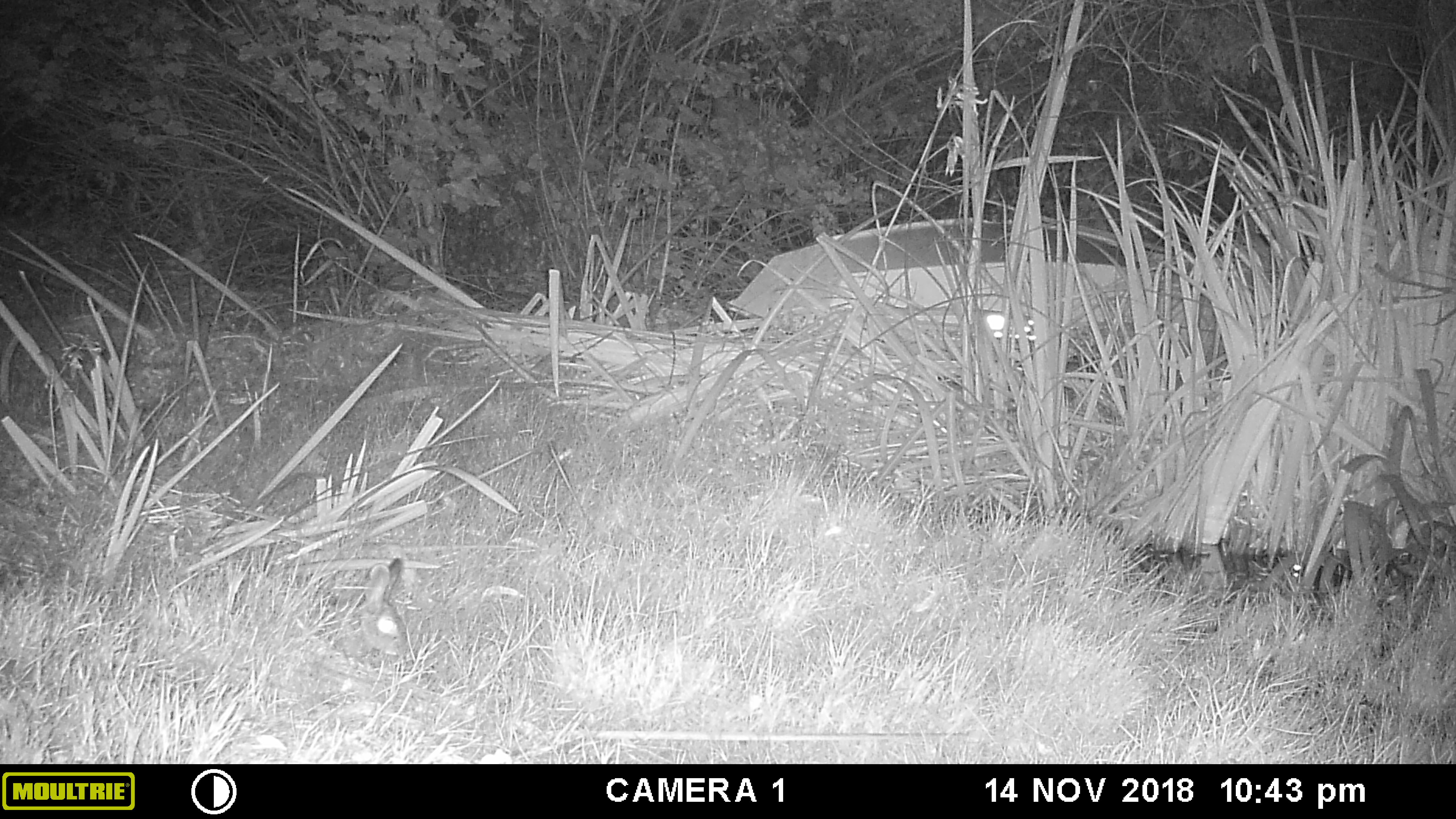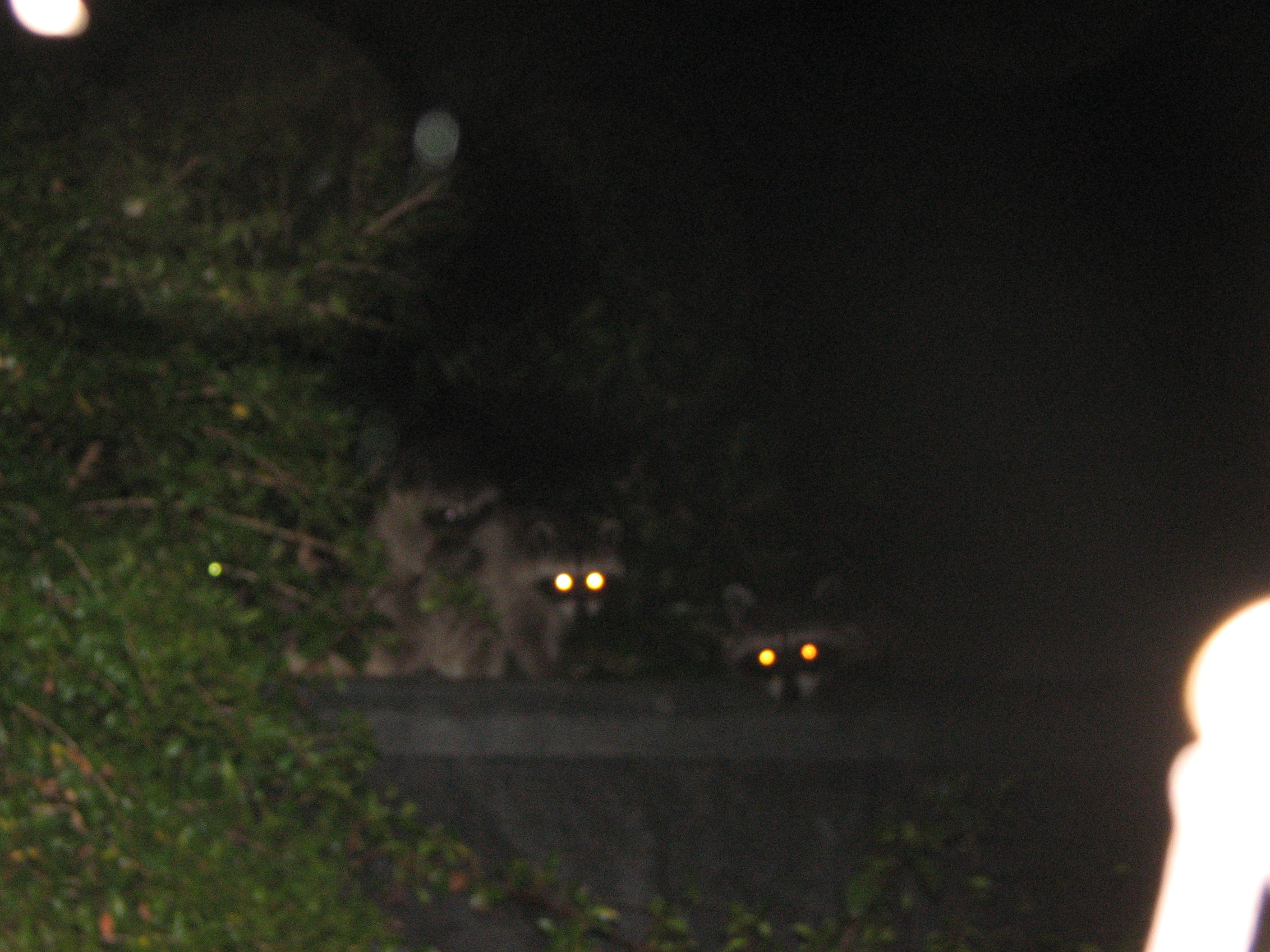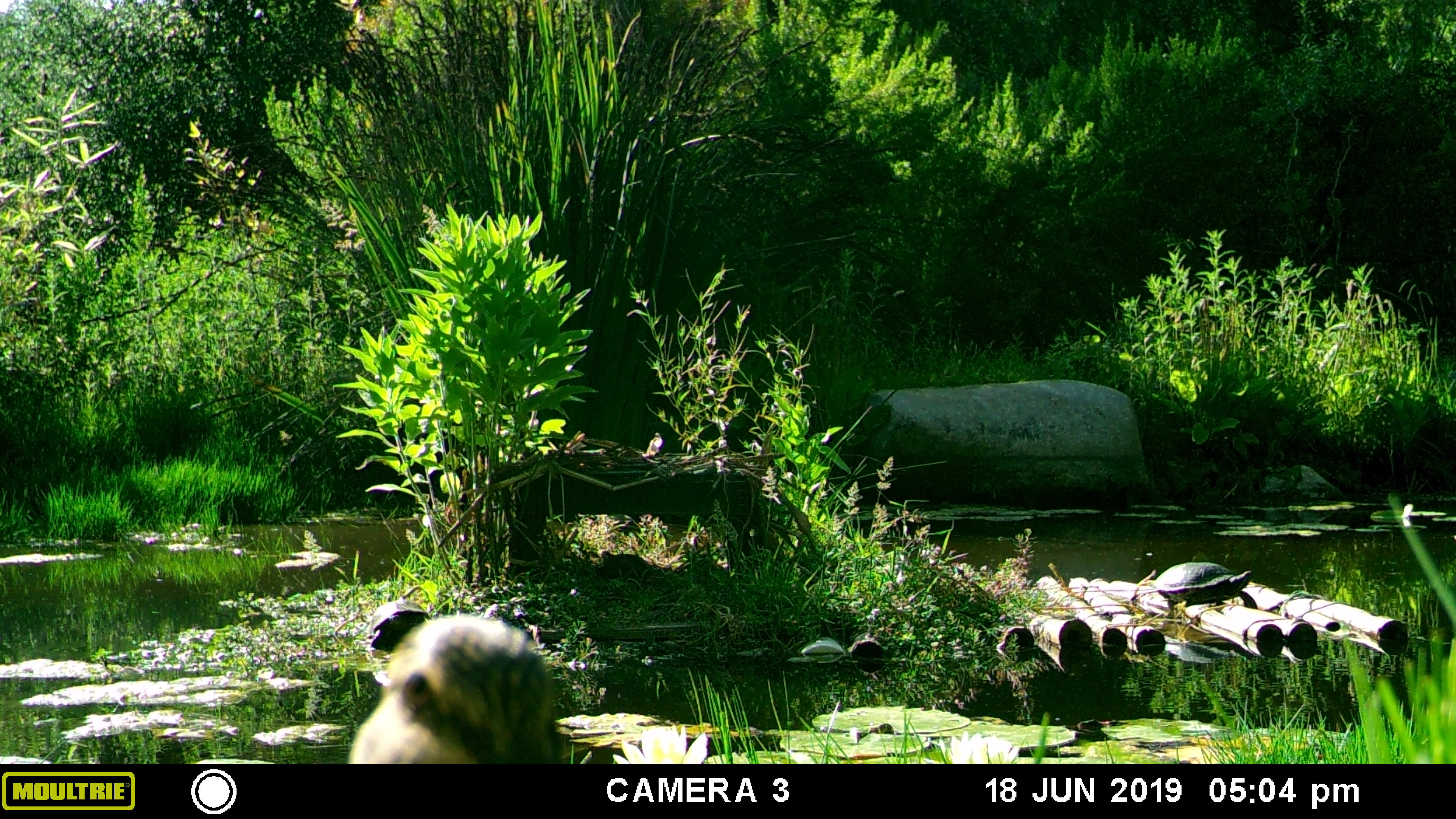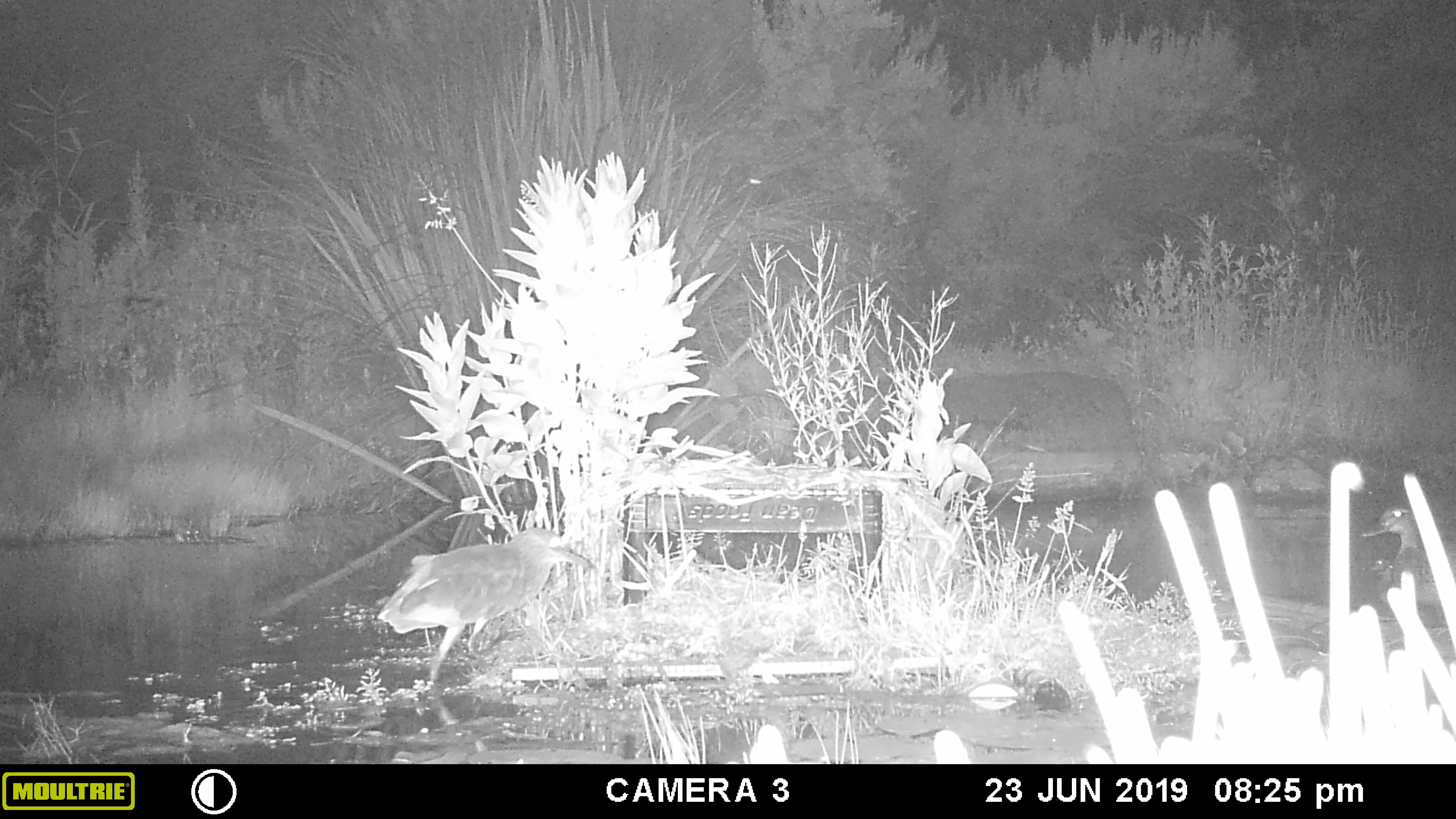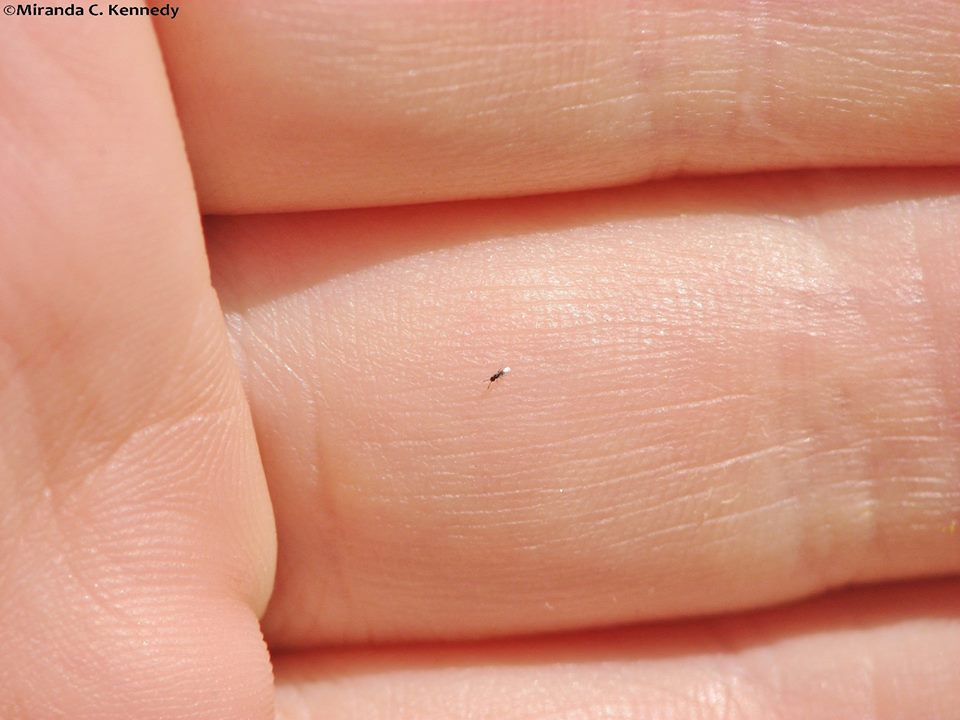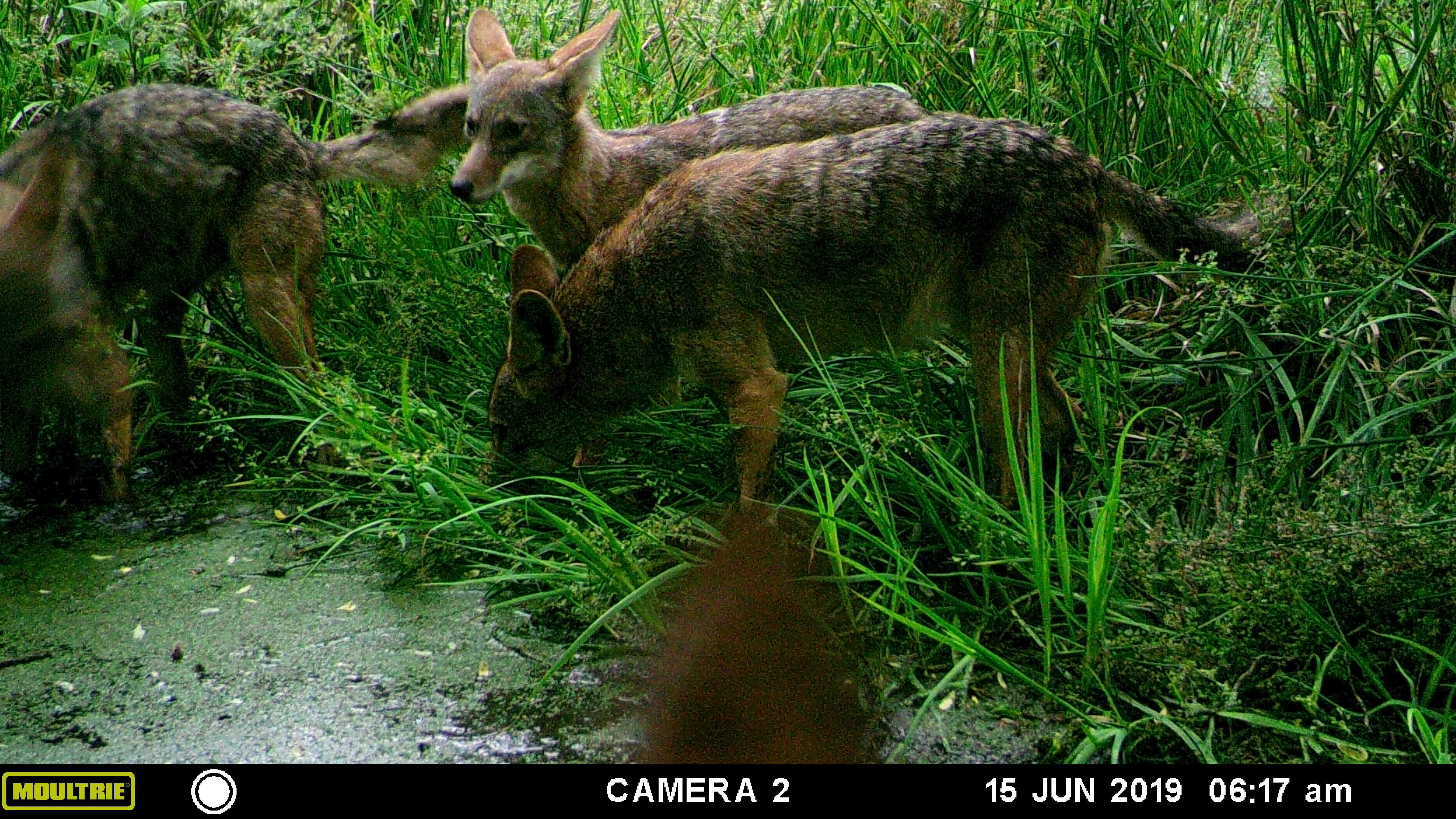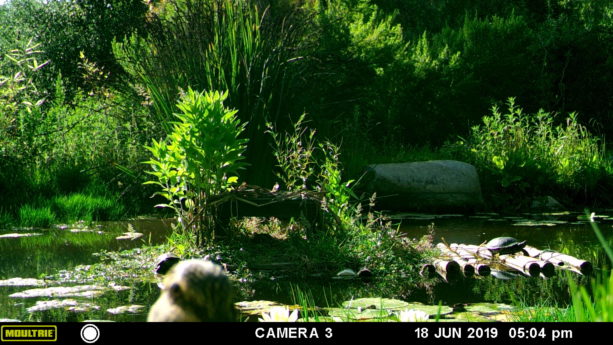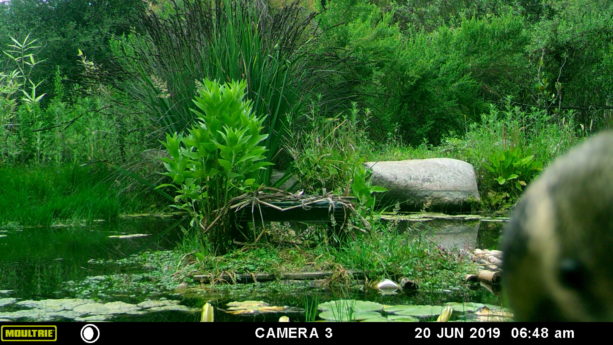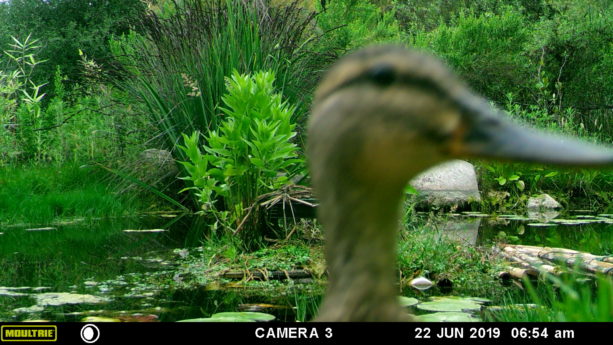-
All the leaves are brown — and the foxes are grey
Through the fall so far, the wildlife cameras have continued to offer an enchanting insight into the usually unscrutinized, quiet shiftings of our habitat.
We’re obviously looking for animal activity on the cameras, but sometimes late or wind-blown-plant triggers capture some beautiful moments from the little ecosystems the cameras overlook.Daily, nightly, a lot of the same animals appear over and over, filling up the SD cards with hundreds of iterations of the same pieces, in snapshots or 15-second installments, of the same stories. This can be challenging to process, but we love the way we’ve come to know the patterns of some of our wildlife’s lives, and even know individuals.

This is the pond bunny. Pond Bunny hangs out in the bottom left corner there, popping in and out of the mule-fat, in and out of the screen. Pond Bunny helped me with rebuilding the little bridge by the withy hide. We love this opportunity to learn about and appreciate each little story: the summer evenings where spidery crane flies fill the creek’s small barranca well with their dramatic bumbling — skittering, over-exposed, in the capture of the infrared lights;
the black phoebe caught, again and again, in Muybridge frozen energy, in aerial sallies on winged insects attracted to the big pond in the afternoon warmth;

the long, still moments as an animal just stands, and looks, pulls in the air and lets its carried scents and noises sink in.
And, of course, we do still covet the unusual — even, playfully, the impossible: as any kid knows, dreaming (im)possibilities is half the fun of any endeavor (“Iron-flanked and bellowing he-hippos clanked and battered through the scudding snow towards us as we passed Mr. Daniel’s house.”). What could come here? I want rare birds to thoughtfully pose, in focus, on the cameras — and also to see a weasel. Maybe lots of weasels. And a scissor-tailed flycatcher would be great. Mom wants hedgehogs and foxes. Reasonable, right?
Well, turns out the foxes are pretty reasonable!
Who knows whether foxes have come through the property before. Who knows if one ever will again — or if it will pass through in a place and fashion that allows our cameras to record it. Tantalizing and wonderful!
(And my weasel dream looks brighter than ever!)
______________________________________________________________________________
Quotation from A Child’s Christmas in Wales by Dylan Thomas -
Owl in Good Time
Delightfully, the streambed wildlife camera has also been picking up an adorable owl visitor these last couple of months. Western Screech Owls (Megascops kennicottii) are certainly present in the area, but much less common to see than Barns and Great Horneds — they’re more reclusive than those much larger species, hunting mostly different prey and small enough to be at risk from larger raptors themselves. The ones on our property have made themselves known by the distinctive “po-po”, ping-pong-ball-bouncing call that only ever rises up from the tangle of trees in the streambed. We’ve only seen one in person on the property once, when a tour stop under the Big Oak above the stream woke it from its chance nap inside the disheveled old owl box dangling from a branch.
But we seem to have at least one — apparently very dirty — screech owl hanging around this summer, taking baths at the camera point at least a couple times a week. And it’s just the cutest darn thing.
“I meant to do that.” A very imperfect ablutioner. Here in lower elevation areas of Southern California, screeches stick near waterways because those habitats are where we have large trees; as cavity nesters that have adapted to have cryptic coloration and patterning that allows them to blend in with bark, large trees are essential. Happily, we have some big trees extant and growing in our little slot of land. And we have a number of conservation organizations locally who are working to preserve wild land and especially land connected to waterways, as these are always areas of higher species density and diversity. And they say that Western Screech Owls readily use owl boxes made to their dimensions. Wish list!
Bath interrupted by a sphinx moth. Crane flies also make cameos. -
This Article is a Stubbin
We took a rare day completely off work last Thursday and had a rainy day in. I say “off work” — we did get some tasks done, but they’re fun tasks that get pushed back by more serious jobs. Seed shopping (!!!) and checking our wildlife camera SD cards.

Hey — who’s in those peas?! Oh, it’s me. The wildlife camera on the wild streambed at the bottom of the property is set to take 15 second videos. Going through these can be a bit of a chore — maybe several hundred to over a thousand a month, and so many are just waving leaves or half a second of raccoon tail going out of shot at the start and fourteen and a half seconds of mud and leaves. Or rats. Lots of thirsty rats.
[Edited down from 15 seconds for your viewing convenience.]
https://youtu.be/MW6rp6LP1KQThe site the camera’s positioned at is an intersection with a runoff vein from another property, so it’s a real bird hotspot, and the streambed acts as a road for larger mammals. Wading through the dreck can really pay off — that’s why we have the camera down there still.
Imagine our startled shrieks of delight when we clicked off another “wind” video and encountered this big, stubby payoff:
It’s not every day you get to add another mammal to your property species list! Come eat our rats, Mr/Ms Bobcat!
-
The Battle of the Bulge
 POND FROLICS
POND FROLICS

In the still of the night….
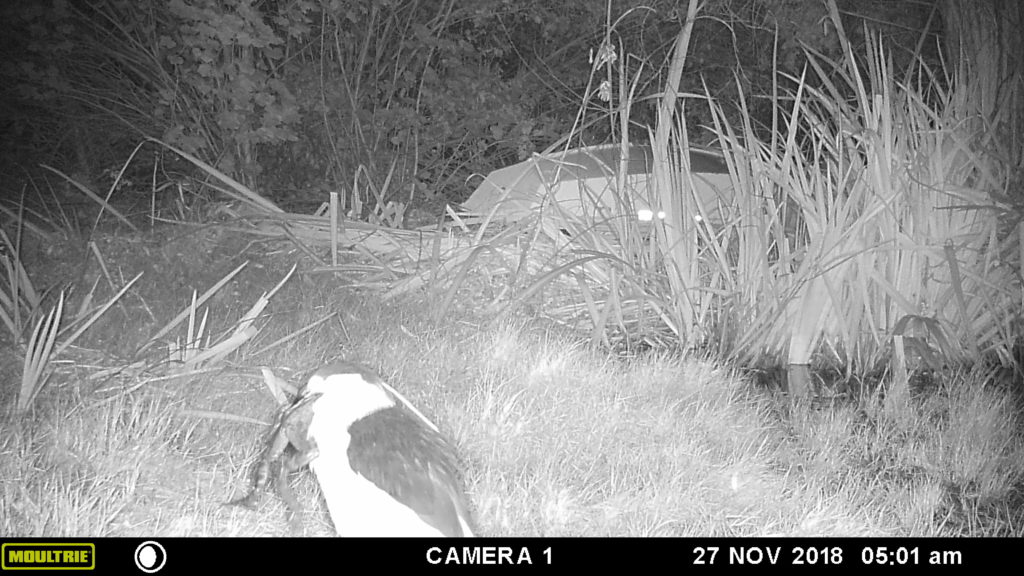
“AHAAAAAH! ‘INGO! Om wi’ EE, ithter ‘ummy!” 
“…Iddle ard oo ‘thallow…” 
“Utht ‘otta adust.” 
“Abee oer ere….” [Five minutes later…]

“Oou know, imma juuuust –“ 

“You know, I really feel like worms, anyway. Yeah. Alright. Let’s go get some worms! Yeah.” -
Owl Be There
 POND FROLICS
POND FROLICS
That nocturnal birds eat at night is a pretty straightforward piece of knowledge — awake at night, ergo eating at night.

It’s also pretty clear to anyone who finds a large dropping on their car in the morning that wasn’t there the evening before that other functions of life have to happen in the hours in which we sleep or stumble into things as well.

It’s funny how surprising it was to me to be confronted with the fact that owls — as of course they must do — also bathe at night.



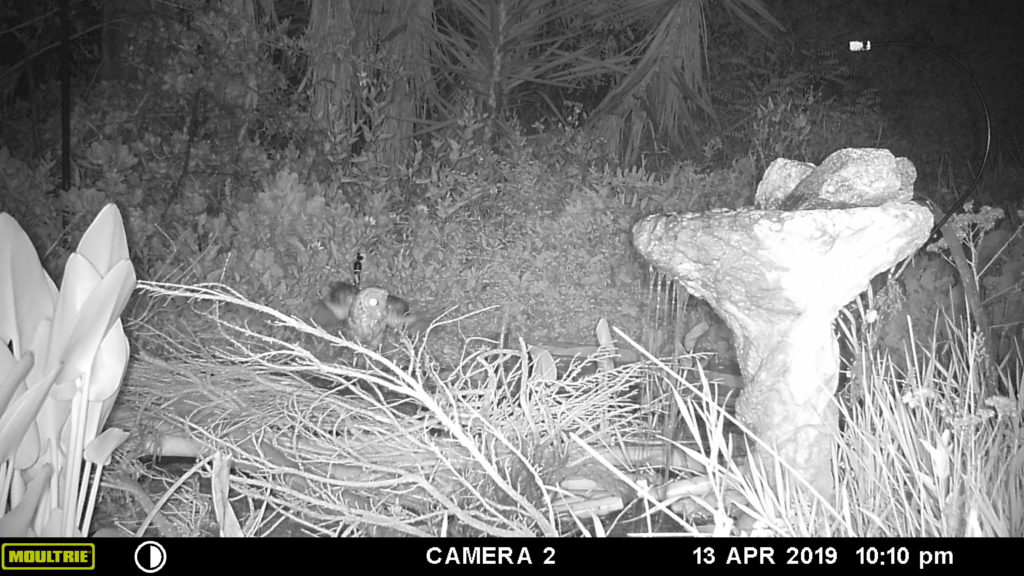
Need to install an owl-dryer out there!
-
The Púkas of Caerbannog
 POND FROLICS
POND FROLICS
Finch Frolic is home to many Desert Cottontails.

Dah-DUM. Dah-DUM. Dah-DUM, dah-DUM, DAH-DUM –! More all the time, in fact.

“Whoa! Do you see what I see?” “Yeah, yeah — when did that rabbit get there?” Or at least very solid population replacement.
We see them all the time because they are pretty comfy here and used to us, just scooting around nibbling grasses and fighting the ducks (I gotta see if I have photos of that to share — hilarious bunny sass…).
The funny thing is how infrequently they appear on the wildlife cameras, and when they do, they’re invariably being rather sneaky.
“Oops, still in shot, sorry.” 


Sometimes, it can start to feel a little spooky….

(Nasty, big, pointy teeth.) 
— Run awaaaay!
-
Coon Tales: The Beginning
 POND FROLICS
POND FROLICS
When we first put out our wildlife camera over the big pond’s north bog, we quickly found that aside from the oppressive scourge of the querulous ducks, raccoons are our most frequent visitors.

“Ooo — I wonder if that little red light is edible?” 
“I can just sneak right up on it….” 
“Hmm — nothing inside this shell to eat. A pointless object.” The story they present is also generally a much more compelling one than the ducks’ — they both have intrigue, romance, action and comedy, but when you’ve watched ducks go back and forth and back and forth and back and forth in petty squabbles for the zillionth time, you come to respect the way the coons economize their time.

INTRIGUE 
COMEDY 
ROMANCE 
ACTION The ducks take the whole day to execute their drama, but the raccoons squeeze it all into night visits lasting only a few minutes, perhaps a quarter of an hour.
Or perhaps only the time it takes to capture a single, perfect picture.
-
New Wildlife Camera Angle
-
Puppy Time
 POND FROLICS
POND FROLICS

Four silly yappi-yotes! We viewed the latest batch of wildlife camera photos the other day and were treated to a stop-motion movie of young coyote antics in the back of the little pond. Every year, we’ve only had the evidence of crepuscular play, so it’s nice to finally get an idea of what shenanigans resulted in the traces left for us (I refer you to the episode of the Great Snake Vanishment). Critically, we gleaned important clues in the mystery of how the hose that tops up the ponds from the well got kinked; 12 hours we put the station on, and the pond level got lower!
Puppies, y’know?


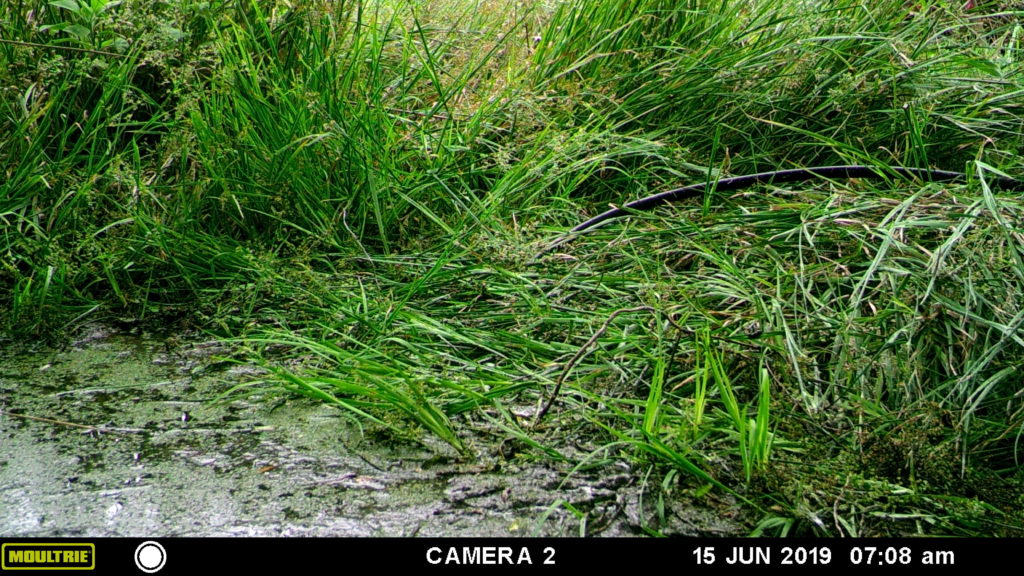

* Yeah. We do good work. * -
Always Time to be Grateful
Today, on Thanksgiving Day, Nov. 22, 2018, as on every other day there is so much to be thankful for. For waking up, for food, clean water and shelter, for friends and family, for the opportunities to volunteer and the ability to do so. this year at age 57 I returned to school, taking Horticulture classes at a local junior college to update my skills and knowledge. I overdid it with four classes, so my time management skills have been as severely tested as my ability to memorize and learn new concepts. Without my daughter’s help it would be less successful.
Finch Frolic Garden continues on and as we close the garden to the public for the winter, it remains open and thriving for wildlife seeking clean water, shelter and food as well. For my birthday, Miranda bought me a game camera which has recorded some interesting life in the bog area of the pond. Now we know why the irises are always smashed. The two glowing orbs from under the boat are just reflections, not a monster, but the ones from the pond are invasive bullfrogs. The juvenile red shouldered hawk has been walking around in the bog several times. Pond life is full of surprises!

MOULTRIE DIGITAL GAME CAMERA 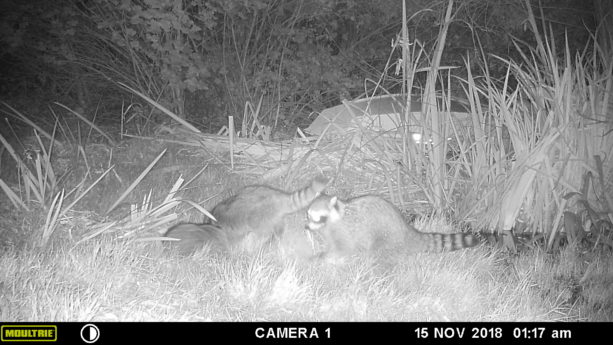
MOULTRIE DIGITAL GAME CAMERA 
MOULTRIE DIGITAL GAME CAMERA 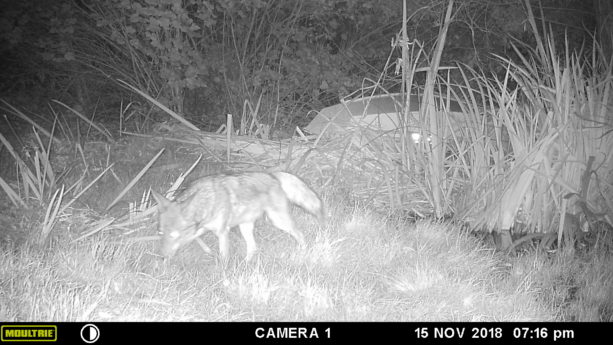
MOULTRIE DIGITAL GAME CAMERA 
MOULTRIE DIGITAL GAME CAMERA 
MOULTRIE DIGITAL GAME CAMERA We didn’t burn this go round with wildfires. We are maintaining, and therefore are so grateful for everything that we have, even the troubles that we have as they are not as severe as so many other’s. I am especially grateful to have a permaculture habitat so that these animals can survive.
Have a wonderful Thanksgiving everyday.
https://youtu.be/xcStEV4QiUE
